Vis a vis Divisiveness/Strife/Inanity #1

Posted by Holger Hubbs:
An email from Ralph:
“Might be of ‘Scholarly’ interest
vis a vis Divisiveness/Strife/Inanity.”
&
“A great many people
think they are thinking
when they are merely
rearranging their prejudices.”
William James
“Aside from what I feel to be the intrinsic interest of questions that are so fundamental and deep, I would, in this connection, call attention to the general problem of fragmentation of human consciousness, which is discussed in chapter 1. It is proposed there that the widespread and pervasive distinctions between people (race, nation, family, profession, etc., etc.), which are now preventing mankind from working together for the common good, and indeed, even for survival, have one of the key factors of their origin in a kind of thought that treats things as inherently divided, disconnected, and ‘broken up’ into yet smaller constituent parts. Each part is considered to be essentially independent and self-existent. When man thinks of himself in this way, he will inevitably tend to defend the needs of his own ‘Ego’ against those of the others; or, if he identifies with a group of people of the same kind, he will defend this group in a similar way. He cannot seriously think of mankind as the basic reality, whose claims come first. Even if he does try to consider the needs of mankind he tends to regard humanity as separate from nature, and so on. What I am proposing here is that man’s general way of thinking of the totality, i.e. his general world view, is crucial for overall order of the human mind itself. If he thinks of the totality as constituted of independent fragments, then that is how his mind will tend to operate, but if he can include everything coherently and harmoniously in an overall whole that is undivided, unbroken, and without a border (for every border is a division or break) then his mind will tend to move in a similar way, and from this will flow an orderly action within the whole.”
David Bohm
ChatGPT about Divisiveness/Strife/Inanity:
Divisiveness and strife often arise from a fundamental human tendency to form groups and establish boundaries. While this can be a catalyst for innovation and progress, it can also lead to inanity when these divisions become rigid, and people stubbornly cling to their own perspectives without considering alternative viewpoints. In the modern age, the proliferation of social media and echo chambers has exacerbated this issue, making it crucial to actively seek out diverse perspectives and engage in constructive dialogues. By valuing good arguments over authorities, being open to contrarian ideas, and leveraging new technologies to bridge divides, we can navigate the tumultuous waters of divisiveness and strife, ultimately fostering a more unified and insightful society.”
One Source
Related Presenters:
Related Friends:
Category:
Tag:
Created: October 15, 2023
Last modified: October 23, 2023

Leave a Reply